- Home
- Jim Eldridge
The Trenches Page 3
The Trenches Read online
Page 3
“Don’t mind him, he’s just jealous,” grinned the soldier called Paddy. “He can’t get used to sleeping in muddy water. Anyway, let’s get you lot sorted out. Believe me, you’re going to be busy!”
Paddy was right. During those first weeks I was busier than I’d ever been in my life.
At the Front there was a complicated system of trenches. Each Infantry trench had two others behind it: a support trench, and then a reserve trench behind that. They were all connected by a communications trench, along which supplies and relief operations were carried out. The telegraph cables were laid along the reserve trench, so the Infantry wouldn’t get caught up in them when they went over the top. The whole thing was a bit like a maze, except made out of mud.
Most of our work consisted of repairing lengths of telegraph cables that had been broken during German artillery attacks. The cables were supposed to have been buried at least 6 feet below ground level so they didn’t get broken when bombs came down, but the shells the Hun had been using of late were so big they were churning up holes in the mud 10 feet deep. There was only one way to repair a smashed cable when that happened and that was to run new lengths and join them on to the last good bit.
We went out on repair missions and worked in teams of two. My team was Charlie and me. Ginger and Wally were a team, and Danny and Alf were the third. The work was tough. You had to cut through the damaged cable, which was hard because it was covered in steel, lead or brass for added protection, and then make the connections. And all the time you were knee-deep in mud, sometimes waist-deep, and waiting for the Hun to launch another artillery attack, or send over a wave of troops armed with guns with bayonets.
The cables were vital for HQ to keep in contact with the troops at the Front. They’d tried using wireless, but it only really worked between aeroplanes and a ground station. Here in the trenches it was almost impossible. Our side had tried it. There was a thing called the British Field Trench Set, which you were supposed to be able to carry about and pick up and transmit messages. The trouble was it needed at least three men to carry it, and another six to carry the batteries needed to work it.
The Engineers had also recently tried a newer wireless set, the Loop Set. This was a bit more efficient. For one thing its aerial could be attached to a bayonet stuck in the ground, and it didn’t need as many men to lug it around. The problem was it only had a range of about 2,000 yards, and lots of the time it just packed up and didn’t work. Which meant we Engineers were always busy laying miles and miles of cables to keep communications going.
During my first few days in the trenches I discovered that what Paddy had said about us “living in luxury” in our hole in the ground was right. In our trench a cave had been dug out of the walls to store our equipment and we could use it as a shelter. For the soldiers of the fighting units, only officers had dugouts, ordinary soldiers had to make do with a waterproof sheet for shelter. Some of them had scraped small holes in the walls of the trench themselves, just large enough to fit in one man sitting down, but it didn’t give much protection either from the elements or from shrapnel. These were known as “funk holes” and the only advantage they offered was that a soldier had a clay seat to sit on and a bit of muddy cover when waiting for action, rather than squatting in a deep puddle of icy muddy water in the open.
I was told by soldiers who’d been in the trenches for some time that this was a quiet patch. It didn’t seem quiet to me. Every time Charlie and me and the other Engineers went out the Germans seemed to be shelling our positions. The first few days I spent most of my time throwing myself into the walls of the trenches, waiting to be hit by a bomb, or by flying shrapnel. Now I knew why soldiers were covered in mud from head to foot.
The first time I heard a high explosive going off it was terrifying. It makes an ear-splitting roar and the world around you shakes violently. Every time I expected the walls of the trench to fall in. Mostly the clay stuck together and held, but sometimes a crack would appear and a thick slice of clay, several feet thick, would topple over and fill in the trench, covering everything beneath it.
Shrapnel was the really terrifying thing. Bits of metal of different sizes, some large, some small, exploding out of a shell and hurtling through the air at incredible speed, slicing through anything in their way.
The mules and horses that hauled the gun carriages and the supply wagons were often caught in the bombing. On my first day I saw two of these poor animals with their legs destroyed by shrapnel, screaming with pain in the mud until they were put out of their misery by a bullet in their head.
On my second day out repairing cables, I saw my first dead man. His head was out of sight, covered in mud. All I could see was the remains of an arm and some ribs, with rotting flesh and bits of uniform sticking to it. Maggots were coming out from the hole in his ribs. I took one look at him and was sick.
“Get it out,” said Charlie, patting me on the back as I vomited. “You’ll see worse than this before this is over.”
The sight of that dead soldier made me think of Rob and Jed and the rest of my old mates from the Lonsdales. I wondered how they were. Had any of them been wounded, or killed? I felt a sinking feeling in my stomach at the thought that, all the time I’d been feeling jealous of Rob because he was with a fighting unit, he might have actually been wounded in the fighting. Or, even worse, been killed. The thought made me shiver.
When we were out working we had to be alert for gas, especially mustard gas. We were told that the Germans also used chlorine and phosgene gas, which got into your lungs and filled them up with water so you drowned. But mustard gas was the worst of all.
Mustard gas didn’t have a smell to warn you, it just crept up on you and next thing you knew you were retching and coughing and blinded, your eyes burning. It killed you by filling your lungs and burning you from the inside. The only defence against gas was the respirator, a weird-looking mask that you pulled on over your face. It had big goggles over your eyes and a hose like an elephant’s trunk coming down to the canister on your front. But those funny-looking respirators saved many men’s lives.
Then there were the rats. I’d seen rats back home in Cumberland, but these trench rats were as big as cats. I was told they fed off the bodies of the men who were left to rot in the muddy waters of the trenches. They had become so used to sharing the trenches with us soldiers that they didn’t run away and hide like rats back home, they walked about quite openly. So you had to make sure that your rations were well and truly hidden away inside your mess tin, otherwise you’d find a rat had got in and eaten them.
With all of this, at the end of my first seven days in the trenches, I was more than ready when the order came for us to return to our billets at Poperinghe.
“It’s a long walk back!” complained Charlie as we trudged our way along the muddy track.
“True, but at least we’ll be in a bed tonight,” I said. “And for the next six nights after that.”
“Quiet back there!” shouted our Sergeant Major. “No talking in the ranks!”
We shut up and marched. Or, rather, trudged. After seven days and nights in the trenches we were all weary, battle-shocked and sore. I noticed that the numbers of the men coming back from the fighting units were fewer than had come out, and for the first time it struck me that I might be lucky that I was with the Engineers rather than the Infantry.
When we arrived back at our billets and were given the order to “Dismiss!”, Charlie took the opportunity to head for the latrines before they got too full. I headed straight for the bathhouse, aiming to get some of the muck off, and get rid of the lice.
Charlie and I realized we’d caught lice after we’d been in the trenches for just two days. That first night I realized I’d got them I’d stripped off all my clothes as soon as I got back to our dugout and started searching for them by the light of a kerosene lamp and began picking them off my skin. It was a waste of time. What I didn’t know was that lice laid their eggs in the seams of y
our clothes, so you could pick off as many as you liked, but more would come as soon as you put your clothes back on. You just had to get used to the fact that lice lived off you, eating at your skin under your clothes, and all you could do was try not to scratch or you’d just make the sores on your skin worse.
Because the problems of lice were so bad, a Delousing Station had been set up for the troops at Poperinghe. It was an old converted brewery.
The Delousing Station was full of men like me who’d just come back from their week in the trenches, all covered with mud. I followed their example. I stripped off and tied my uniform and my underwear into a bundle, and then tied my hat and boots to it.
My clothes were put into a fumigator along with everyone else’s. Then I followed the others, all naked and with their skin covered in blotches and bites from the lice, into the delousing area.
The three large vats that they once used to brew beer in were full of water. The water in the first one was hot and soapy, but very, very dirty. It looked more like soup. Along with a bunch of other men I stepped in and jumped up and down a bit, letting the hot water get into my skin.
“Come on, no hanging about,” complained a voice behind me. “There’s others waiting.”
I took the hint. I grabbed hold of the rope that was hung across the vats and pulled myself along to the other side. Then I climbed out and got into the next vat. The water was hot and not quite so dirty. After that it was into the third vat – and the shock of freezing cold water.
I got out quickly and towelled myself as dry as I could, and collected my clothes, which now stank of smoke and disinfectant.
Once I was cleaned up, I went off to our billet and collected Charlie and the others, and we set off for Poperinghe, and the place where I’d been told all the soldiers went for relaxation, Marguerite’s café.
The place looked tiny from the outside, but inside it seemed to go on for ever. And it was packed with blokes in khaki. The air was thick with smoke from cigarettes. And the noise! Soldiers singing and laughing. Looking at this lot it was hard to think there was a war on. It was very different to the pubs back home in Carlisle. They were places for serious drinking of beer. This place was more like a cafeteria or a club.
Ginger, Wally, Danny and Alf hurried straight in, heading for the bar, while Charlie and I stood just inside the entrance looking for a table, when I heard a familiar voice call out, “Billy! Over here!” I turned, and there was Rob! He was sitting at a table in one corner of the café where Jed Lowe and a couple of other blokes from the Lonsdales were sitting.
I waved at him, and Charlie and me began to battle our way through the crowd to the table. Rob had managed to grab a couple of empty chairs.
I made the introductions, and Charlie and Rob and the others shook hands.
“This is amazing, Rob!” I said. “I was thinking about you, wondering how you were!”
“As you can see, still alive,” grinned Rob.
“How long have you been out here?” I asked.
“About four weeks,” replied Rob. “We’re going back to the Front tomorrow.” He looked around at the smoky, noisy café and said, “You’ll like this place, Billy. They do really great chips. Not as good as back home in Carlisle, but still very good. That is, if you can catch the waiter’s eye.”
He poured Charlie and me a glass of white wine.
“Here you are, try some of this,” said Rob.
“No beer?” asked Charlie.
“Yeah, but this stuff’s cheaper,” said Rob. “Vin rouge or vin blanc. Red or white. Take your choice.” He grinned. “Listen to me. Only been here four weeks and I’m talking French like a native.”
For the rest of the evening, against the noise of soldiers at other tables around us playing cards, or dominoes, and a local man playing popular songs on his old accordion, Rob and I caught up.
I wanted to know what it was like in the Infantry, but Rob said he’d prefer to leave the trenches back at the Front where they belonged and concentrate on what I’d been up to.
Of course, my experiences had been much the same as his, but without a rifle and going into attack. We’d both spent most of the time up to our knees in muddy water.
I did learn that there didn’t seem to be much of an advance going on, either by our side or by the Germans.
“A stalemate, that’s what it is,” said Rob, sipping at his wine. “Our lot lob bombs at them. Their lot lob bombs at us. Then sometimes we go over the top and charge at them, and then we come back again. And sometimes they charge at us, and then they go back again. Or, at least, the lucky ones do.” And his face darkened as the memories of the battlefield came back to him. “Lots never make it back. Their bodies just lie there, in the middle of No Man’s Land. Too many of them to go out and bring back. And if you tried you’d only end up there yourself.” Then he smiled again and the shadow on his brow vanished. “Still, forget that. Let’s get back to you. What’s it like being in the Royal Engineers?”
And so I told him of my training, and the classes I’d had to go to back in England. Yet here I was, still digging trenches.
“Think yourself lucky you are,” grinned Rob. “You wouldn’t like it in the Infantry. Apart from the fact the Hun keep shooting at us every time we pop our heads over the top of the trench, our Sergeant Major is worse than old Mr Dickens back at school. Shouts and hollers like he’s angrier with us than he is with the Germans!”
And so the night went on, until finally the man playing the accordion stopped and a woman shouted out, “Allez! Allez!”, which I was told meant “Time to go home”.
And so we went back to barracks. “I’ll see you, old pal,” said Rob when we got back to camp, and Charlie and I were heading off for our billets.
I shook his hand. “Take care of yourself, Rob,” I said. “And we’ll keep in touch whenever we can.”
“With lots more nights like tonight at Marguerite’s,” grinned Rob.
June 1917
All too soon our leave was over, and we were back in the trenches. Just after midnight on 6 June we were all summoned to assemble for a briefing.
“A briefing at midnight!” snorted Charlie. “Why couldn’t they tell us what they’ve got to tell us at a reasonable hour, instead of us having to scramble about in the mud in the dark?”
“Got to be some sort of top secret,” suggested Wally. “They don’t want the Germans to see us all standing in line in the trenches and giving the game away that something’s up.”
We filed out of our cave and lined up with the rest of the men in our reserve trench, where our Commanding Officer, Lieutenant Jackson, addressed us. I felt we were lucky because Lieutenant Jackson was all right. He wasn’t friendly with us and he kept his distance, which suited us fine, but he wasn’t like some of the officers I’d seen. They treated the soldiers under them like they were schoolkids, or like they were prisoners who were under constant punishment.
“Men,” he said, “a major offensive is about to be launched on the Messines Ridge at just after 0300 hours. Although the ridge is some distance away from us, we will all be affected, because just before the offensive a series of explosions will be set off beneath the German lines. You will all feel the shock waves and they will be larger than you are used to. They will be nothing to worry about. However, we have been instructed that it will be considered safest if, when the explosives are detonated, all men are in full view in the trench and not in a dugout. Dismissed, and carry on about your duties.”
Me, Charlie, Wally, Danny, Ginger and Alf scrambled back inside our cave where we were fixing cable lengths together.
“The Messines Ridge is miles away to the south,” commented Danny. “I can’t see why we have to stand out in the trench just because they’re letting off a few explosions. It won’t affect us.”
As most of the others nodded, I noticed that Alf was looking thoughtful.
“What’s the matter, Alf?” I asked. “You look worried.”
“No, I was j
ust thinking,” said Alf. “I don’t think this is going to be just any old explosion. It’s going to be a big one.”
The tone of his voice made us all look at him, surprised. Alf wasn’t one for making up stories. As a rule he didn’t say a lot.
“What makes you say that?” asked Danny.
Alf hesitated, and I threw in, “Come on, Alf, you’ve said enough to whet our appetites. We’re your mates. If something big’s going to be happening in less than three hours and it affects us, and you know about it, you ought to tell us.”
Ginger, Wally, Charlie and Danny all nodded in agreement.
“OK,” said Alf. “But first, go out and check that there’s no one outside listening. I don’t want to get arrested for betraying official secrets.”
“It’s not an official secret any more,” I pointed out. “Lieutenant Jackson’s just told us all it’s all going to happen at 0300 hours. So what’s the secrecy for?”
Alf wasn’t convinced. He had to go to the entrance of our cave and look up and down the trench to make sure there was no one outside listening, before he came back and started to tell us what he knew.
“Just before I left home to go training I met up with my Uncle Harry. He was a coalminer back home and one night he was telling us about a job he and loads of his miner mates had been sent on, but because it was all Top Secret he wasn’t supposed to tell anyone.”
“So why did he tell you?” I asked, puzzled.
Alf gave a rueful sigh. “Because Uncle Harry can’t keep a secret,” he said. “He talks all the time. Drives my Aunt Ethel mad.”
“Forget about your Aunt Ethel, get back to what he told you,” said Charlie impatiently.
“Right,” said Alf. “Well, according to Uncle Harry the army were digging tunnels under this place in Belgium called Messines Ridge. They needed coalminers instead of just ordinary soldiers. From Wales, Yorkshire, Nottinghamshire. And not just coalminers. They also brought over all these cockneys from London, the ones who’d built the London underground, because they were also used to digging tunnels in clay.”

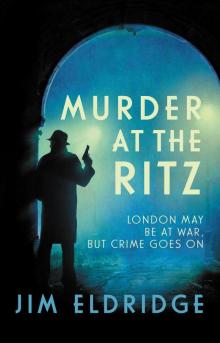 Murder at the Ritz
Murder at the Ritz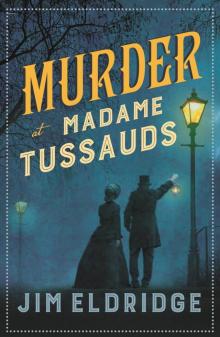 Murder at Madame Tussauds
Murder at Madame Tussauds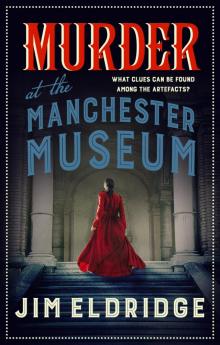 Murder at the Manchester Museum
Murder at the Manchester Museum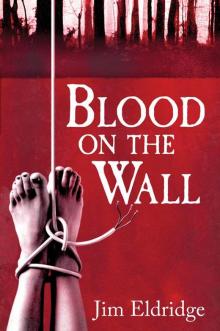 Blood On the Wall
Blood On the Wall 4.3.2.1
4.3.2.1 Jungle Kill (Black Ops)
Jungle Kill (Black Ops)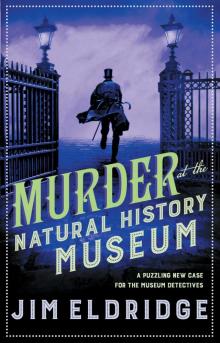 Murder at the Natural History Museum
Murder at the Natural History Museum Murder at the British Museum
Murder at the British Museum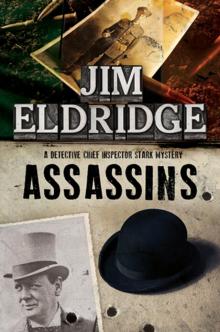 Assassins
Assassins Hunk and Thud
Hunk and Thud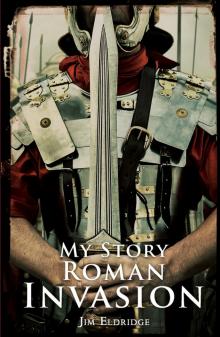 Roman Invasion
Roman Invasion Big Rock and the Masked Avenger
Big Rock and the Masked Avenger The Last Enemy
The Last Enemy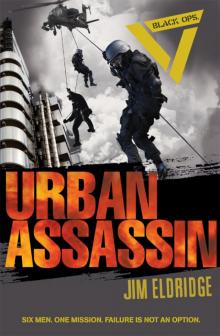 Urban Assassin
Urban Assassin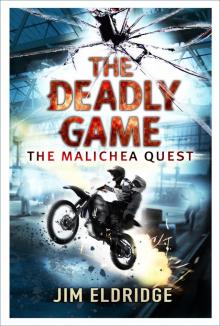 The Deadly Game
The Deadly Game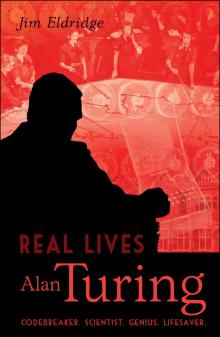 Alan Turing
Alan Turing The Lethal Target
The Lethal Target The Giant Rumble
The Giant Rumble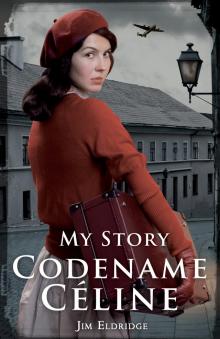 Codename Céline
Codename Céline Death in the Desert
Death in the Desert Escape from Pompeii
Escape from Pompeii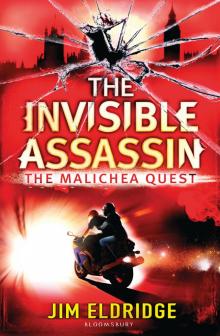 The Invisible Assassin
The Invisible Assassin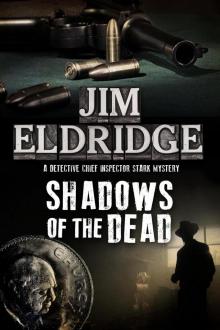 Shadows of the Dead
Shadows of the Dead Jack Versus Veto
Jack Versus Veto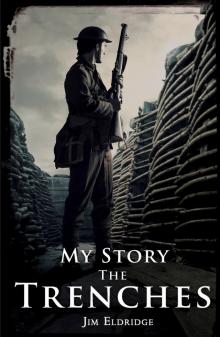 The Trenches
The Trenches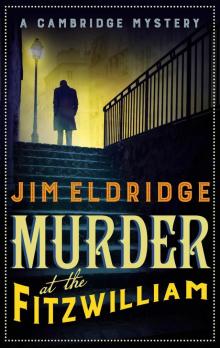 Murder at the Fitzwilliam
Murder at the Fitzwilliam Coming Home
Coming Home